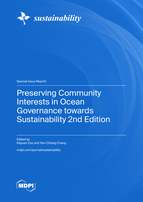Preserving Community Interests in Ocean Governance towards Sustainability 2nd Edition
A special issue of Sustainability (ISSN 2071-1050). This special issue belongs to the section "Sustainable Oceans".
Deadline for manuscript submissions: closed (20 December 2023) | Viewed by 21169
Special Issue Editors
Interests: international law; Chinese law; ocean law and policy; international relations
Special Issues, Collections and Topics in MDPI journals
Interests: international law; ocean law and policy; ocean governance; energy law
Special Issues, Collections and Topics in MDPI journals
Special Issue Information
Dear Colleagues,
Thank you all for supporting the first edition of our Special Issue. This second edition of the Special Issue is also designed to discuss and examine relevant legal issues concerning ocean governance in the context of United Nations Sustainable Development Goals (SDGs) for long-lasting benefits for the international community. It will cover, inter alia, the safety of navigation and maritime security, the sustainable use of marine resources (living and non-living), marine environmental protection, climate change, and marine scientific research.
Brief background
It is increasingly clear that the protection of the marine environment and the sustainable development of marine resources have been the most important components in global ocean governance and closely related to the vital interests of the whole international community. Although there are international normative documents and arrangements concerning ocean governance such as the United Nations Convention on the Law of the Sea (UNCLOS), the Rio Declaration, and the United Nations Sustainable Development Goals, the traditional mare liberum doctrine still remains firm in the promotion of national interests as individual states continue to grab marine space and resources in an unsustainable manner without seriously considering the collective interests of the international community as well as the interests of future generations. Such national selfishness has caused severe environmental risks and disasters in the ocean, particularly maritime areas beyond national jurisdiction, including the high seas, Antarctica, and the international seabed (the area), which are commonly known as “global commons” but are of vital interest to the present generation as well as future generations. Thus, the rationale for preserving the community interests in ocean governance towards sustainability has become increasingly urgent.
The overall focus, scope and purpose of this Special Issue
This Special Issue is designed to focus on the community interests in ocean governance towards sustainability, and how to preserve these interests through the effective implementation of international law for the sea and of the SDGs. The scope of the Special Issue will cover several edge-cutting areas: first, it will examine relevant legal issues concerning ocean governance in the context of SDGs for long-lasting benefits for the international community; second, it will identify new legal obligations to safeguard navigation and maritime security by considering the marine environment; third, it will evaluate effective legal frameworks for the sustainable use of marine resources (living and non-living); and fourth, it will discuss the regulations for marine scientific research and new developments of marine technologies for marine environmental protection. The purpose of this Special Issue is to highlight the concept of community interests in sustainable ocean governance, which will be fully reflected in a series of anticipated papers.
Relationship between this Special Issue and other research on the topic
References to community interests appear from time to time in scholarly writings in the field of international relations and international law. The concept of community interests refers to interests protected by international law binding either all, or a group of, states and go beyond the delimitation of a sovereign sphere of influence. In the literature, there are existing examples of research, such as in books and journal articles, that consider the various manifestations of what has been described as “community interests” in many areas regulated by international law, including natural resources, global markets, human rights, and the use of force, and observe how law has evolved from a legal system based on more or less specific consent and aimed at promoting particular interests of states, to one that is more generally oriented towards collectively protecting common interests and values. However, the topic is never thoroughly researched and there is a huge gap in the existing literature, particularly in the context of ocean governance and sustainability. This Special Issue attempts to fill this gap, so as to attract more studies on this important topic in academia.
Prof. Dr. Keyuan Zou
Prof. Dr. Yen-Chiang Chang
Guest Editors
Manuscript Submission Information
Manuscripts should be submitted online at www.mdpi.com by registering and logging in to this website. Once you are registered, click here to go to the submission form. Manuscripts can be submitted until the deadline. All submissions that pass pre-check are peer-reviewed. Accepted papers will be published continuously in the journal (as soon as accepted) and will be listed together on the special issue website. Research articles, review articles as well as short communications are invited. For planned papers, a title and short abstract (about 100 words) can be sent to the Editorial Office for announcement on this website.
Submitted manuscripts should not have been published previously, nor be under consideration for publication elsewhere (except conference proceedings papers). All manuscripts are thoroughly refereed through a single-blind peer-review process. A guide for authors and other relevant information for submission of manuscripts is available on the Instructions for Authors page. Sustainability is an international peer-reviewed open access semimonthly journal published by MDPI.
Please visit the Instructions for Authors page before submitting a manuscript. The Article Processing Charge (APC) for publication in this open access journal is 2400 CHF (Swiss Francs). Submitted papers should be well formatted and use good English. Authors may use MDPI's English editing service prior to publication or during author revisions.
Keywords
- community interests
- humankind
- ocean governance
- SDGs
- sustainable development
- maritime security
- piracy
- climate change
- marine fishery
- transfer of technology
- deepsea mining
- benefit-sharing
- marine genetic resources
- BBNJ
- integrated coastal management
- marine environmental protection
- marine ecological damage







